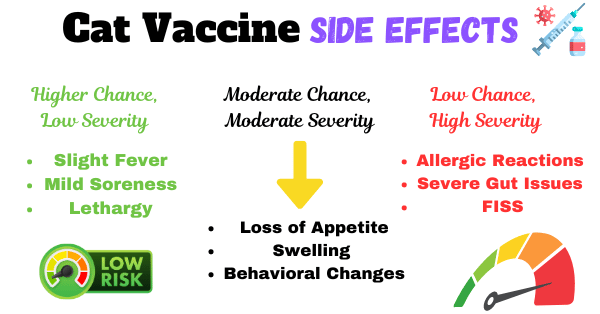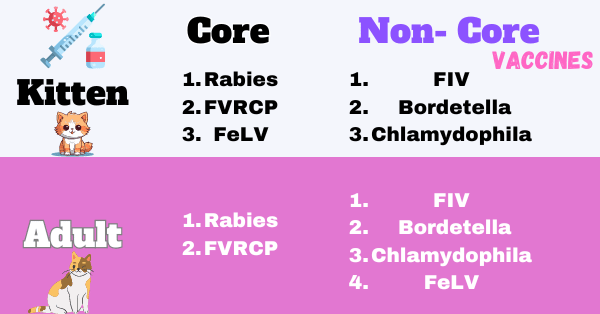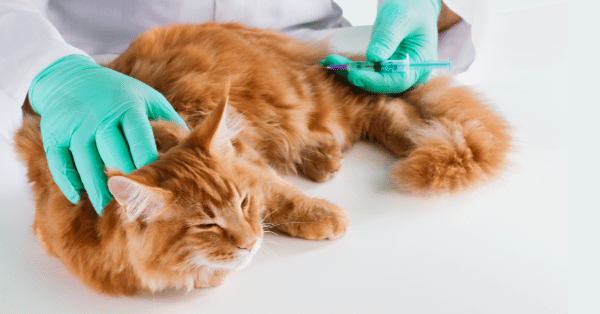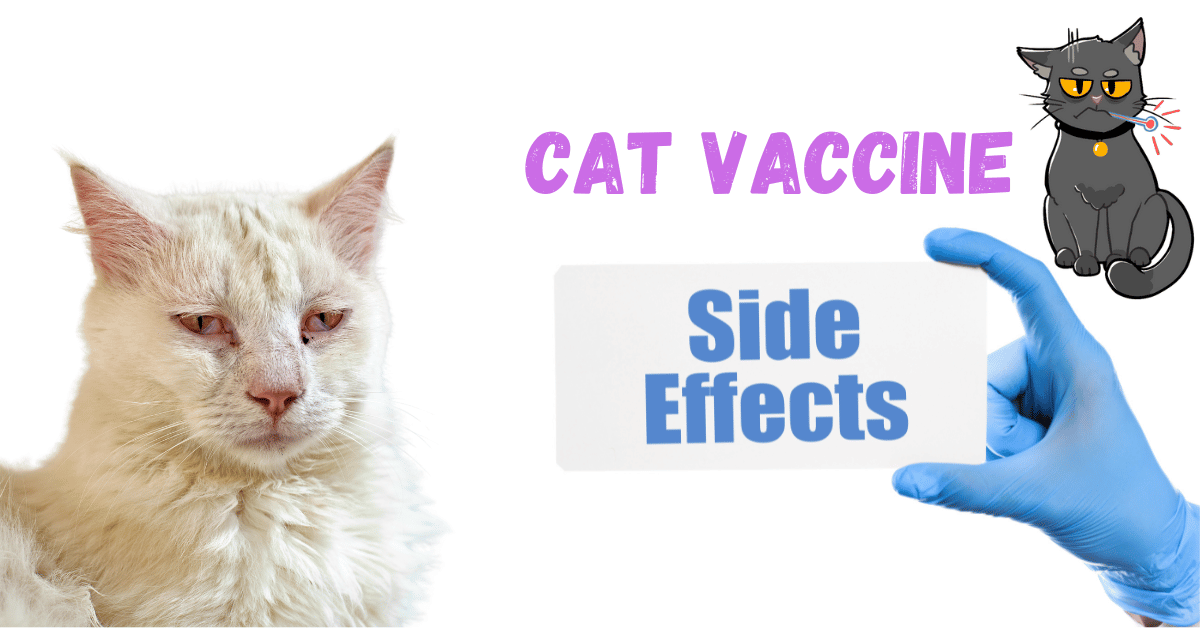This post contains affiliate links and I will be compensated if you make a purchase after clicking on my links.
Understanding Cat Vaccine Side Effects: An Essential Guide
Vaccinations are more than just a prickly subject; they’re a critical part of your furry friend’s healthcare regimen, designed to prompt their immune defenses without letting the actual ‘bad guys’ in. So, why do we vaccinate our cats?
Simply put, to arm their immune systems against invasions of specific infectious diseases. This defensive training can sometimes stir up mild reactions, ranging from a tender touch at the injection site to a slight fever, or in rare cases, more severe allergic reactions.
But before you get your whiskers in a twist, let’s decode what’s normal, what’s not, and why these tiny shields are vital for your cat’s health armor.

What Are Cat Vaccines?
Imagine a tiny training camp inside your cat where their immune system learns to combat enemies. That’s essentially what vaccines do. They introduce a safe version of an illness to your cat’s immune system, teaching it to recognize and fight the disease without actually causing the illness.
This preparation is crucial because it helps your cat fend off future infections, potentially lessening the severity of diseases or dodging them altogether.
Common vaccines for cats include:
- FVRCP: Also known as the Distemper Shot (Feline Viral Rhinotracheitis, Calicivirus, and Panleukopenia), is considered a core vaccine, essential regardless of your cat’s lifestyle.
- Rabies: Mandatory in many places due to its severe implications and zoonotic risk (transmissible to humans).
- FeLV (Feline Leukemia Virus): Recommended as a core vaccine for kittens and for cats that have exposure to the outdoors or other cats.
These vaccines are your cat’s personal line of defense, safeguarding not just them but also the community by preventing the spread of contagious diseases. While adverse reactions are possible, they’re mostly mild and far less perilous than the diseases themselves.
Tip: While we’ve discussed the most common cat vaccines, there are others not mentioned that can also cause side effects. Reactions are rare, occurring in about 0.52% of cats, or 52 in 10,000, and do not imply that the vaccine was administered incorrectly or was defective. These reactions typically result from an exaggerated immune response to the vaccine’s components

Identifying Common Cat Vaccine Side Effects
Following a vaccination, your cat might experience a few side effects. These are generally mild and actually signal that the vaccine is springing into action—a good sign that your kitty’s immune system is gearing up. These reactions are most likely to pop up within a few hours after the vaccine has been administered, but don’t be surprised if they take a few days to show.
Some typical responses you might notice include:
- Fever: It’s not unusual for cats to run a slight fever as their immune system gears up to build defenses.
- Mild Soreness or Tenderness at the Site of Injection: Just like humans, cats can feel a bit sore where the needle went in.
- Lethargy: Your usually playful kitty might seem a bit more laid back or tired, preferring a cozy nap over chasing toys.
- Loss of Appetite: Don’t be alarmed if your cat isn’t as interested in meals as usual; this can happen when they’re feeling under the weather.
- Swelling and Redness around the Injection Site: Keep an eye on the injection site; some swelling or redness is normal, but it should diminish after a few days.
- Lameness: Occasionally, cats might show a slight limp or difficulty moving if the injection site is bothering them.
- Hives: If you notice small, raised bumps on your cat’s skin, this could be a sign of an allergic reaction.
These symptoms are normal and should only last a day or two. They’re simply signs that your cat’s body is building protection against diseases.
Tip: If any of the above symptoms appear, it’s wise to contact your veterinarian. Particularly, any lumps that develop should be checked out and possibly biopsied by your vet to ensure everything is okay.
When Cat Vaccine Side Effects Are Serious

While most vaccine reactions in cats are just minor hiccups on the road to immunity, it’s crucial to be aware of the signs that things might be veering off course. Serious reactions are rare, but one severe form of vaccine reaction is anaphylaxis (allergic shock).
This life-threatening condition has symptoms that demand immediate attention, and knowing what to watch for can be a game-changer, allowing you to act fast and get your feline friend the help they need.
Here are some symptoms that should have you dialing your vet right away:
- Vomiting and Diarrhea: These can be signs of distress from the body reacting negatively to the vaccine.
- Facial or Whole-body Itching: If your cat seems unusually itchy or starts to scratch more than usual, it could indicate an allergic reaction.
- Respiratory Distress: Difficulty breathing, wheezing, or any signs of respiratory discomfort are immediate red flags.
- Shock: Look for signs like extreme lethargy, collapse, or unresponsiveness, which can indicate shock.
Feline Injection-Site Sarcoma (FISS)
Among the rarer side effects of vaccinations, Feline Injection-Site Sarcoma (FISS) is a type of cancer that has garnered significant attention. This serious condition can develop at the site of injection and, though extremely rare, affects approximately 1 in 10,000 to 30,000 vaccinations. Initially, experts believed that adjuvants in vaccines—substances added to enhance the immune response—were to blame.
However, recent studies have clarified that FISS can also arise from other types of injections, such as those for administering subcutaneous fluids, insulin, and even microchipping.
Given its rarity but serious nature, it’s crucial to keep a watchful eye on your cat’s injection sites. Any persistent lumps should not be ignored. If you notice a lump that doesn’t resolve itself within a few weeks, it’s wise to have your vet take a look. Early detection and evaluation are key in managing this rare but significant risk effectively
Managing Cat Vaccine Side Effects: Practical Advice
When your cat experiences the usual post-vaccine symptoms, there are several simple but effective ways to help them feel better:
- Warm Compresses: Applying a warm towel gently to the injection site can help alleviate soreness.
- Comfort and Quiet: Providing a quiet, cozy spot for your cat to rest can help them recover from lethargy and tenderness more comfortably.
- Hydration: Make sure your cat stays hydrated. A little extra water can go a long way in helping them recover from any minor fever or lethargy.
For more severe symptoms, such as those indicating an allergic reaction or extreme pain, it’s crucial to contact your veterinarian immediately.
They might recommend:
- Pain Medication: Your vet can prescribe pain relief tailored to your cat’s needs.
- Antihistamines or Steroids: For allergic reactions, medications like diphenhydramine or corticosteroids can be administered under veterinary guidance.
- Emergency Care: In cases of anaphylaxis or severe distress, immediate veterinary intervention and possible hospitalization are crucial to treat life-threatening symptoms effectively.
The Bigger Picture: Weighing the Benefits vs. Risks of Cat Vaccinations
Despite the potential for side effects, the scale heavily tips in favor of vaccinating your cat. Vaccinations play a pivotal role in preventing serious diseases, many of which are not just life-threatening but can also be passed on to humans. By vaccinating your cat, you’re not just protecting them; you’re keeping your family and community safe.
Leading veterinary organizations worldwide, including the AVMA, AAHA, and AAFP, strongly advocate for regular vaccinations as part of responsible pet care. The risk of your cat experiencing severe side effects is minimal compared to the protection vaccines offer against formidable diseases.
Wrapping Up: A Closer Look at Cat Vaccine Side Effects
While the thought of your cat experiencing any discomfort might be unsettling, understanding these side effects and knowing how to respond can make all the difference.
Remember, most cats breeze through their vaccinations with nothing more than a momentary flinch. For those few that do experience side effects, now you’re equipped with the knowledge to handle it adeptly.
Vaccinations are a vital part of your cat’s health regimen, ensuring they lead a long, happy, and healthy life. By keeping up with your cat’s vaccinations and monitoring any post-vaccine reactions, you’re taking a significant step toward safeguarding their well-being and ensuring many more purr-filled years together.
Meet Sean, a fintech whiz with a penchant for pet purrs and blockchain buzz. After a decade of fintech feats, Sean’s tech talents leaped from ledger lines to litter lines, driven by a passion for pets and a vision for a more connected pet care community. With three critter companions as co-pilots, Sean launched this blog to share a treasury of pet-friendly tech tips and tales.


